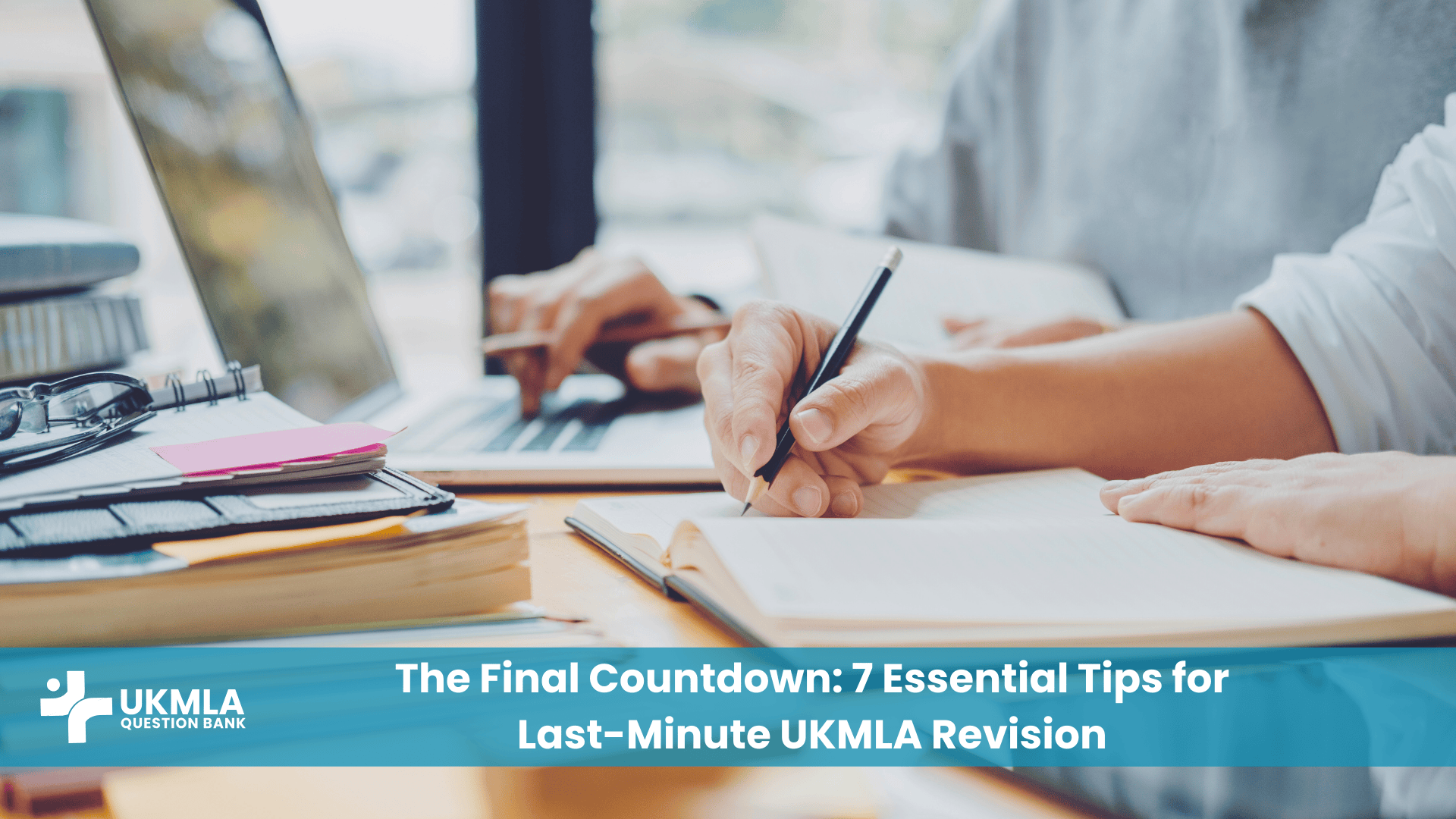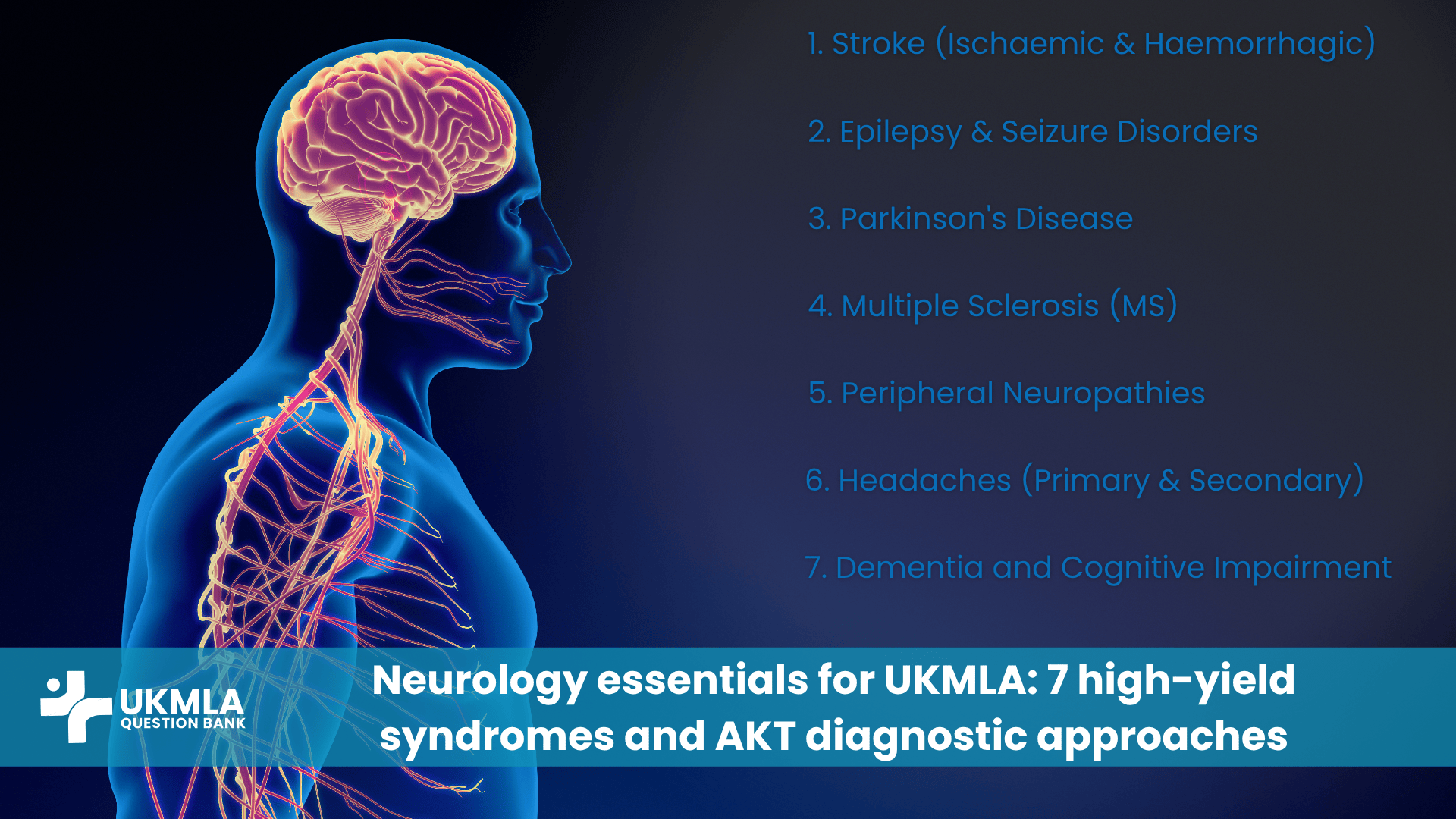Introduction
Your last-minute UKMLA revision period, typically the final one to two weeks, is a unique and challenging phase. The feeling of time accelerating, coupled with the immense pressure of the upcoming exam, can create a perfect storm of anxiety. The natural temptation is to panic, leading to chaotic, inefficient, and counterproductive study habits like all-night cramming sessions. This is the time when a smart strategy is more important than sheer hours worked.
This guide is designed to be your calm, strategic companion through these final weeks. The goal is not to learn the entirety of medicine from scratch, but to consolidate your existing knowledge, sharpen your exam technique, and manage your well-being so you can walk into the exam hall feeling confident and prepared. We will provide seven essential, actionable tips that will help you work smart, not just hard, transforming this period of high stress into your most effective phase of preparation.
Table of Contents
ToggleYour Strategy for Last-Minute UKMLA Revision
1. Shift Your Mindset: From Learning to Consolidating
The most critical mental shift you must make in the final weeks is from learning to consolidating. The process of encoding new, complex information into long-term memory is time-consuming. Trying to cram new topics now is not only stressful but also highly inefficient, as this freshly learned knowledge is fragile and easily forgotten under pressure.
Your focus should now be on strengthening the knowledge you already have. This means reviewing topics you’ve previously studied, patching up small knowledge gaps, and, most importantly, practicing the retrieval of information. Every time you answer a practice question, you are strengthening the neural pathways associated with that piece of information, making it easier and faster to access during the actual exam.
2. Be Ruthless with Prioritization
This is the time to apply the 80/20 principle (the Pareto principle), which suggests that 80% of the results come from 20% of the effort. Your task is to identify that critical 20% of topics.
Start by revisiting your self-assessment against the official GMC – UKMLA Resources content map. Look at your question bank analytics to see which subjects have your lowest scores. This is not the time to polish your strongest subjects; it’s the time to turn your weakest areas from a liability into a strength. Focus your energy on the frequently tested topics for the UKMLA AKT where you feel least confident. Every hour spent improving a weak area is worth more than an hour spent reviewing something you already know well.
3. Make Question Banks Your Primary Tool
In the final weeks, your primary study tool should shift almost exclusively to your question bank. Passive reading of textbooks should be minimal and targeted only to clarify concepts you got wrong in a practice question.
The key is to use the question bank to simulate the exam environment. Focus on doing timed, mixed-subject blocks of questions. This builds your mental stamina, improves your time management, and gets you comfortable with the rapid context-switching required in the UKMLA. Spend as much, if not more, time reviewing the explanations—both for the questions you got right and the ones you got wrong—as you do answering them. This review process is where the deepest consolidation occurs.
4. Use Your Final Mock Exam Strategically
Taking a full-length mock exam is essential, but its timing is crucial. You should aim to take your final mock at the start of your last two weeks, not a day or two before the exam. The goal of this mock is not just to get a predictive score, but to perform a final, high-level diagnostic.
After the mock, analyze your performance with a critical eye. Where did you lose marks? Was it due to knowledge gaps, running out of time, or misreading the questions? This analysis will provide the final, focused list of topics and skills you need to work on in the remaining days. For more on this, see our UKMLA mock exams guide.
5. Create and Perfect Your “Brain Dump” Sheet
The brain dump is a powerful technique for managing cognitive load on exam day. In the final weeks, you should create and perfect a single A4 page containing only the most volatile, high-yield information that you personally struggle to recall under pressure.
This sheet is your personal safety net. It should include things like scoring systems (GCS, CURB-65), key formulas, pediatric milestones, or specific drug pathways. Review this sheet once a day, and practice writing it out from memory until you can do it in under three minutes. This is one of the most effective last-minute strategies, and you can learn more about it in our dedicated guide to the UKMLA brain dump.
6. Prioritize Your Well-being (Sleep is a Revision Tool)
The temptation in the final weeks is to sacrifice sleep for extra hours of study. This is the single worst thing you can do. Sleep is not a passive activity; it is when your brain works to consolidate memories and move information from short-term to long-term storage.
As Matthew Walker, a leading neuroscientist, states: “Sleep is the single most effective thing we can do to reset our brain and body health each day.”
An all-nighter will actively harm your performance by impairing your recall, attention, and problem-solving abilities the next day. Aim for 7-8 hours of quality sleep per night. Pay attention to your nutrition, stay hydrated, and try to get at least 20-30 minutes of light exercise, like a brisk walk, each day. For more advice, the NHS – Every Mind Matters guide to sleep is an excellent resource.
7. Plan Your Exam Day Down to the Minute
On exam day, you want to use all your mental energy on the questions, not on logistics. In the final week, finalize your exam day plan to eliminate any potential sources of stress. This is a core component of any good UKMLA exam-day checklist.
Your plan should include:
The Night Before: What time you will go to bed, laying out your clothes and packing your bag.
Your Bag: Pack your admission ticket, ID, water, snacks, and any permitted comfort items.
Travel: How are you getting to the test center? Plan your route and a backup route. Aim to arrive at least 30-45 minutes early.
Exam Morning: What you will eat for breakfast (choose something familiar), and your pre-exam ritual (e.g., a final glance at your brain dump sheet, a short walk).
Common Last-Minute Mistakes to Avoid
Knowledge of what not to do in the final weeks is just as important as knowing what to do.
Table 1: Common Last-Minute Mistakes and Their Solutions
| Mistake | Why It’s a Problem | The Solution |
|---|---|---|
| Drastic Routine Changes | Suddenly starting to study at night if you’re a morning person disrupts your body clock and reduces efficiency. | Stick to the routine your body is used to. Consistency is key in the final weeks. |
| Resource Hopping | Panicking and buying a new question bank or textbook a week before the exam. | Trust the resources you’ve been using. Introducing new materials now will only cause confusion and anxiety. |
| Post-Mortem Panic | Discussing questions with friends during the lunch break or after day one of the AKT. | Avoid all discussion of exam content until it’s completely over. It only creates anxiety and cannot change your answers. |
| Caffeine Overload | Relying on excessive caffeine to fuel all-nighters. | This leads to poor sleep, increased anxiety, and an inevitable energy crash. Stick to your normal intake. |
A Sample Final Week Timetable
This is a template, not a prescription. The key is the balance of activities, not the specific timings.
Table 2: Sample Final Week Timetable
| Day | Morning (3 hours) | Afternoon (3 hours) | Evening |
|---|---|---|---|
| Mon | 120 Timed Mixed Qs | Review Qs & Notes on Weak Areas | Relax / Light Exercise |
| Tues | 120 Timed Mixed Qs | Review Qs & Brain Dump Practice | Relax / Hobbies |
| Weds | 120 Timed Mixed Qs | Review Qs & Notes on Weak Areas | Relax / Social |
| Thurs | 120 Timed Mixed Qs | Review Qs & Brain Dump Practice | Relax / Light Exercise |
| Fri | 60 Timed Mixed Qs | Review Final Brain Dump Sheet | Pack Bag, Relax |
| Sat | EXAM DAY 1 | Rest & Recover | Light Meal, Early Night |
| Sun | Light Review (1 hr max) | EXAM DAY 2 | Celebrate! |
Frequently Asked Questions (FAQ) about Last-Minute UKMLA Prep
Yes, this is highly recommended. Your brain needs time to rest and consolidate. Lightly reviewing your brain dump sheet for 30-60 minutes is fine, but you should spend the rest of the day relaxing and doing something you enjoy to de-stress.
No, this is a very low-yield and passive activity. Your time is much better spent doing practice questions and only referring to the textbook for specific concepts you get wrong.
Don’t panic. Quickly review the topic using a concise, high-yield resource (like the Oxford Handbook). Don’t spend more than an hour on it. It’s better to have a solid overview than to get bogged down trying to become an expert at the last minute.
Quality is more important than quantity. Aiming for 100-150 questions per day with thorough review is a solid goal for most students. This is more effective than rushing through 300 questions with poor review.
This depends on your group dynamic. If you have a focused study group for running through quick-fire questions, it can be helpful. However, avoid unstructured sessions that can turn into anxiety-fueled complaint sessions.
Focus on balanced meals with complex carbohydrates for sustained energy (like oats and whole grains), lean protein, and plenty of fruits and vegetables. Avoid excessive sugar and processed foods, which can lead to energy crashes.
No, this is a high-risk strategy. A poor score could shatter your confidence, and a good score could make you complacent. Your final mock should be done at least 5-7 days before the exam to give you time to act on the results.
This is a very common feeling and is usually a product of anxiety, not actual memory loss. Trust the months of preparation you have put in. This is where your brain dump sheet can be a great confidence booster.
The AKT is a knowledge-based exam, and last-minute consolidation can make a big difference. While you shouldn’t neglect the CPSA, your time in the final week is likely best spent on the vast syllabus of the AKT. Continue to mentally run through CPSA stations, but prioritize AKT question practice.
Plan a specific, relaxing activity. Watch a familiar movie, listen to a calming playlist, have a nice meal, or do some light stretching. Avoid screen time for at least an hour before bed. Practice a simple mindfulness or breathing exercise to calm your mind.
Conclusion
Your last-minute UKMLA revision period is a test of strategy as much as it is a test of knowledge. The key to success in these final, crucial weeks is not to panic and work harder, but to calm down and work smarter. By shifting your mindset from learning to consolidation, being ruthless with your priorities, and focusing on active, question-based revision, you can make significant gains.
Trust the months of hard work you have already invested. Your goal now is to protect that investment by looking after your physical and mental health, and by approaching the exam with a clear, logical plan. You have the knowledge. This final phase is about ensuring you can access and apply it effectively when it matters most. Walk into that exam hall knowing you prepared intelligently right to the very end.




